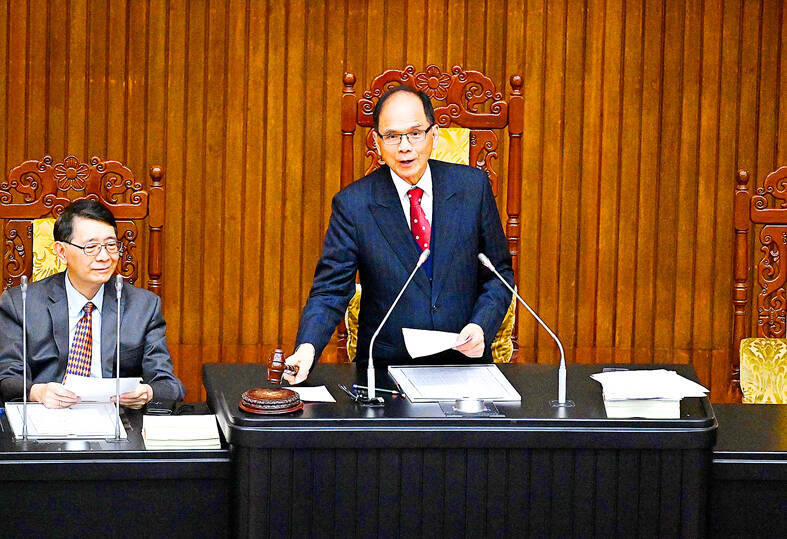The Legislative Yuan yesterday passed amendments to the Statute of Open Prisons (外役監條例) that raise the threshold for an inmate’s eligibility to be transferred to a minimum-security prison.
Under the amendments, an inmate must have served at least one-third of their sentence to be eligible, or one half of their sentence for those serving terms for repeat offenses.
It must also be within one year before they become eligible for parole.

Photo: Chu Pei-hsiung, Taipei Times
The inmate must have demonstrated good behavior while in prison, and must be deemed to pose no threat to the public.
Those who are in prison for committing felonies that carry a minimum 10-year prison sentence — for example, robbery, kidnapping for ransom, privately detaining others, aggravated fraud or crimes involving the sexual exploitation of children — are not eligible for transfer to a minimum-security facility.
An inmate who has broken a restraining order imposed under the Domestic Violence Prevention Act (家庭暴力防治法) is also not eligible, nor is one who is involved in a separate ongoing case and is considered a flight risk.
Those who are serving fixed-term seven-year sentences for crimes stipulated under the Banking Act (銀行法), the Financial Holding Company Act (金融控股公司法), the Credit Cooperatives Act (信用合作社法) or any other law related to the finance sector are also not eligible, with the exception of those who have no criminal proceeds or whose criminal proceeds have been confiscated under the law.
Those who are serving sentences for embezzlement or appropriation of public funds must return the proceeds of the crime before becoming eligible for transfer.
The Ministry of Justice previously proposed an amendment to the law following the alleged killing of two police officers by Lin Hsin-wu (林信吾), an inmate who had been serving in a minimum-security prison when he escaped.
That proposal was shelved as legislators across party lines failed to reach a consensus on its content.
Discussions on the law’s amendment were recently revived after Yi Pao-hung (易寶宏) — who is serving time for his involvement in a 2014 case in which police officers were killed in a nightclub shooting — was transferred to a minimum-security prison, resulting in a backlash from the public.

An essay competition jointly organized by a local writing society and a publisher affiliated with the Chinese Communist Party (CCP) might have contravened the Act Governing Relations Between the People of the Taiwan Area and the Mainland Area (臺灣地區與大陸地區人民關係條例), the Mainland Affairs Council (MAC) said on Thursday. “In this case, the partner organization is clearly an agency under the CCP’s Fujian Provincial Committee,” MAC Deputy Minister and spokesperson Liang Wen-chieh (梁文傑) said at a news briefing in Taipei. “It also involves bringing Taiwanese students to China with all-expenses-paid arrangements to attend award ceremonies and camps,” Liang said. Those two “characteristics” are typically sufficient

The brilliant blue waters, thick foliage and bucolic atmosphere on this seemingly idyllic archipelago deep in the Pacific Ocean belie the key role it now plays in a titanic geopolitical struggle. Palau is again on the front line as China, and the US and its allies prepare their forces in an intensifying contest for control over the Asia-Pacific region. The democratic nation of just 17,000 people hosts US-controlled airstrips and soon-to-be-completed radar installations that the US military describes as “critical” to monitoring vast swathes of water and airspace. It is also a key piece of the second island chain, a string of

A magnitude 5.9 earthquake that struck about 33km off the coast of Hualien City was the "main shock" in a series of quakes in the area, with aftershocks expected over the next three days, the Central Weather Administration (CWA) said yesterday. Prior to the magnitude 5.9 quake shaking most of Taiwan at 6:53pm yesterday, six other earthquakes stronger than a magnitude of 4, starting with a magnitude 5.5 quake at 6:09pm, occurred in the area. CWA Seismological Center Director Wu Chien-fu (吳健富) confirmed that the quakes were all part of the same series and that the magnitude 5.5 temblor was

The Central Weather Administration has issued a heat alert for southeastern Taiwan, warning of temperatures as high as 36°C today, while alerting some coastal areas of strong winds later in the day. Kaohsiung’s Neimen District (內門) and Pingtung County’s Neipu Township (內埔) are under an orange heat alert, which warns of temperatures as high as 36°C for three consecutive days, the CWA said, citing southwest winds. The heat would also extend to Tainan’s Nansi (楠西) and Yujing (玉井) districts, as well as Pingtung’s Gaoshu (高樹), Yanpu (鹽埔) and Majia (瑪家) townships, it said, forecasting highs of up to 36°C in those areas